CONVERSATIONS WITH SAI
Satyopanishad - Part 22
Direct Directions from the Divine
Dear Reader,
In response to your positive feedback to this section where we have a conversation with the Divine, we continue with Prof. Anil Kumar’s ‘Satyopanishad’ following Dr. John Hislop’s series ‘Conversations with Bhagavan Sri Sathya Sai Baba’ that ended in January 2008.
This series is also in the question-answer format that many devotees prefer, and has answers from Bhagavan on topics as wide ranging as the origin of evil, the goals of human life, and aspects of God – embodied and formless, to price hikes, women’s liberation, vegetarianism, and the generation gap among people of the present times.
Published in two parts by the author, these volumes have 270 questions in all, which are neatly grouped under separate chapters. In this issue, we continue chapter seven, “Sadhana, The Inner Door”.
CHAPTER VII:
Sadhana, The Inner Door
Prof. Anil Kumar: Swami! Now we understand from Your divine discourse and by Your grace how important is devotion. But, faith is the base of devotion. How is one to cultivate faith, Swami?
 |
|
Bhagavan: What a foolish question you have asked! What do you mean by ‘cultivating faith’? Can you cultivate it? Is that a commodity to be purchased from a shop? It can neither be given nor received. Faith is your natural quality. In fact, faith (visvasa) is your breath (svasa). Without it, you cannot breathe.
Just think for a moment how you carry on your daily routine with or without faith. You will soon notice that your every action, both mundane and spiritual, is based only on faith. You give your clothes, costly shirts and safari suits, to a washerman in full faith that he would bring them back after washing and ironing.
If you suspect that he would run away with your clothes, will you give them to him? Most valuable gold is given to goldsmiths to make jewellery out of it in good faith that they would do so. Even if a trace of doubt arises in your mind, will you ever hand over valuable gold?
You go to a barber for a haircut. Do you for a moment entertain the feeling that he would put his knife not on your head but in your neck? You bend your head in good faith in front of the barber to have your hair cut. So also in good faith, a patient lies down on the operation table and allows himself to be operated upon by the surgeon.
Do you doubt that your life is not safe in his hands? No. So, be he a washerman or a goldsmith or a barber or a doctor for that matter, all transactions are made in good faith. So faith is a natural gift of God to mankind. To be faithless is unnatural and artificial. But the pity of it is that you have full faith in everyone but not in God. Isn't that very unfortunate?
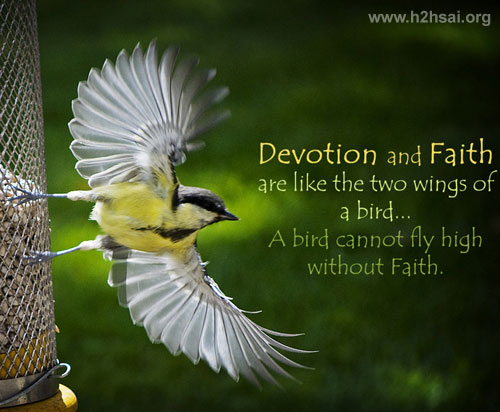 |
Devotion and faith are like the two eyes of a living being or the two wheels of a bicycle or the two wings of a bird. Without faith, as we say, even an ant can't move an inch. A bird cannot fly high without faith. A bird perches on a branch. The branch may be drooping or swinging, yet the bird is not bothered. Why? It is because the bird has full faith in its wings on which it relies but not on the branch. So, everything depends on your faith.
Faith is a natural gift of God to mankind. To be faithless is unnatural and artificial. But the pity of it is that you have full faith in everyone but not in God. Isn't that very unfortunate? |
How do you know your father? It is your mother, who has the authority to show you your father and you have full faith in your mother. If not, there is no way to know your father. You know the dates and the days from a calendar and you go by what the calendar indicates. Otherwise, how do you know that today, say, is Monday, the 14th May? The day has not appeared in front of you with a signboard on the forehead indicating the day of the week and the date. You have full faith in all that you listen to from the All India Radio news bulletin and the various news columns that you go through in a newspaper.
So much so, you believe what you hear on the radio, watch on the T.V., read in the newspapers, but you don't believe our rishi vakya, or the sayings and teachings of our sages and saints of yore, embodied in the Vedas and other holy scriptures. The Vedas are called isvariya, apauru seya, that is, compositions that have come from God. You don't have faith in them. How strange and unfortunate it is! Think over it for sometime.
Prof. Anil Kumar: Swami! Why are some people not devoted to God? Devotion, it seems, has no place in their lives. Would you kindly tell us the reason?
Bhagavan: Very simple. It is only sensual pleasure that makes people disinclined towards God. Meaningless worry about the future, excessive desires, building castles in the air are a way of life with them. Ambition to reach heights they don't deserve and too much attachment to the family and the world, all these are factors that make a man not devoted to God. There can be no other reason beyond these.
If the stress is laid on the world, your love of God will be less, and on the other hand, if your love of God is greater (heavy at one end as in the game) your attachment to the world becomes less (light at the another end). |
You know the seesaw on which children play. If one end goes up, the other end comes down, and vice versa. If the stress is laid on the world, your love of God will be less, and on the other hand, if your love of God is greater (heavy at one end as in the game) your attachment to the world becomes less (light at the another end). This is how the balance works. Isn't it so?
 |
I will give you another example, that of a magnet. It draws iron filings towards it. But sometimes it doesn't. Why? If the iron pieces are rusted and dusty, they are not drawn and attracted by the magnet. Likewise, those people who are like iron pieces that are dusty and rusted by worldly desires, are not drawn to God, the 'Divine Magnet'. Now, is it clear why some are not devoted to God?
Prof. Anil Kumar: Swami! Kindly give a direction to our spiritual pursuit? How should it continue? Like the flow of a river, what are the restrictions to be observed?
Bhagavan: Nasreyo niyamam vina (Do not ever stray away from the rules). Everything must have limits without which you will face risks and dangers. A river that flows under certain conditions with banks on either side serves irrigation purposes better. Similarly, the river of life has two banks, one on each side, which is samsayatma vinasyati that is,‘the one who doubts perishes’ and on the other side is sraddhavan labhate gyanam, that is ‘By sincerity alone you develop wisdom’.
Once you doubt, all that you do will go in vain and nothing will be fruitful. No amount of scholarship or sadhana can help you if you allow doubt to step into your mind. |
Your river of life should flow between these two banks. Your faith should not be shaken; it should never waver. Your faith should be strong and deep. No adverse situations and negative moments should make you lose your faith.
A life without faith is like a pot with holes. You know that we water only the roots of a plant. Yet, water is supplied to all parts of the plant. You do not water the stem, branches and leaves separately. Similarly, the water of faith, if supplied to the roots of your life, will take care of everything else related to life. The tree of life can sustain itself if the water of faith is supplied to its root. Without this, the plant dries up and is no longer alive. It becomes firewood. Once you doubt, all that you do will go in vain and nothing will be fruitful. No amount of scholarship or sadhana can help you if you allow doubt to step into your mind.
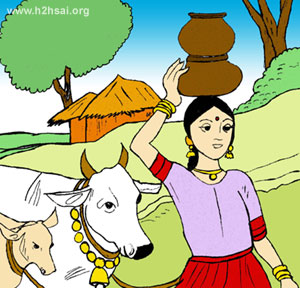 |
|
A small illustration: There was a pandit in a certain village. Daily, a milkmaid from the neighboring village used to bring him milk crossing a river by boat. In the process there was necessarily some delay in supplying milk to the pandit.
One day the pandit questioned her and wanted to know the reason for the delay. She replied, “Oh Panditji! I have to cross the river by boat everyday to bring milk. I can only get into the second trip of the boat because the boatman will load in the first trip all the elders of the village. There is no alternative left for me. So, I am late”.
Then the pandit said, “Look! Why do you need to come by boat? I suggest that you carry the milk pots over your head and cross the river chanting God's name. The river will give way and you won't need to wait for the boat.”
The milkmaid believed in what the pandit said and so on the next day she could come on time and gave him the pot full of milk.
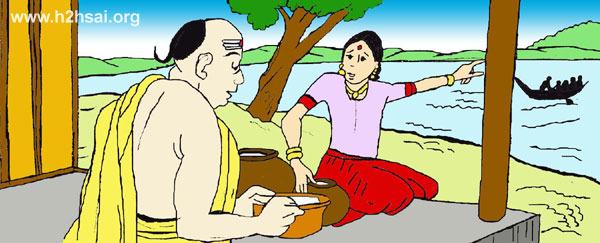 |
Then on his enquiry, she told him that she could bring the milk on time by simply following his instructions. The pandit was very much astonished at this, and could not believe her words and decided to verify the fact himself. He said to her, “Good! Now as you go back I shall follow you and see you as you cross the river chanting God's name and how the river gives way for you to cross it!"
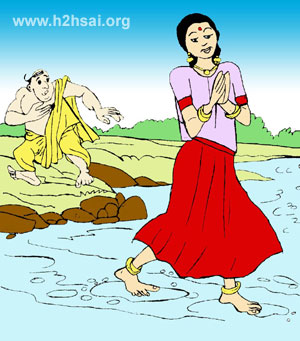 |
|
Both of them came near the riverside. The milkmaid acted exactly according to the pandit’s instructions, that is, chanting the name of God. The pandit also wanted to act in the same way. He stepped forward and lifted his dhoti up to his knees so that his clothes would not be wet.
He marched into the river step by step doubting if he would drown in the river. His doubt became a reality and he got drowned. Faith made the milkmaid walk across the river, while the pandit had no faith in his own words. Hence he fell into the river.
The bank on the other side of the river of life is sraddha, sincerity, steadfastness, that confers Jnana, wisdom. You will be sincere only if you love the work you do. You should have full faith and love to become sincere.
A student cannot pass the examinations if he has no faith that he can read, loves the subject and studies it sincerely. So, visvasa, prema and s'raddha (faith, love and sincerity) are the three steps that give you success in your attempts. A businessman or a lawyer or a doctor must be sincere, must have sraddha, in order to be successful in their profession.
So for Jnana, you should be sincere and steadfast. What type of Jnana should it be? It is not physical, material, secular or worldly knowledge. It is the practical knowledge, anubhava jnana, that you get when you are sincere and steadfast. So these are the two banks on either side of the river of life, doubtlessness and sincerity or steadfastness.
Prof. Anil Kumar: Swami! Why and how do we get evil feelings such as jealousy, envy, pride, egoism, attachment and so on? How are we to get away from these evil feelings?
Bhagavan: The main cause for all these evil feelings is your body attachment. These feelings are born in your mind. They depend on your interactions and relationships with others.
A small example: Suppose you have a very intimate friend with whom you agree on everything. By chance, if you toss a rose flower at him, he will be immensely happy for your love and reverence. As ill luck would have it, if you do not see eye to eye with each other due to some differences, and if you toss a rose at him, he will totally misunderstand you. He will think that it is a deliberate action on your part to harm him, for your friend is a sugar patient (diabetic) and as such if a thorn of the flower by chance pricks him, it may cause an injury that never heals and even further complicates leading to the amputation of his hand.
See the difference. The two individuals are the same. So also is the rose flower. But during the period of friendly terms, the act is viewed positively, and in the unfriendly period the same actions are viewed negatively. You will now know that everything lies in the mind. The rose flower that gives happiness to your friend creates suspicion in the mind of the same person during the period of animosity.
Then, let me tell you about your next weakness, anger. Why should you and what for should you be angry with anyone? You tend to lose your energy due to anger. You become weak subsequently. The energy you have gained out of the food you have consumed during a couple of months is lost by a single fit of your anger. Here, enquire into the matter clearly. What exactly makes you angry? If anyone criticises, reprimands, accuses, or blames you, naturally you are angry with that person.
 |
|
Calm down for a moment and investigate clearly. Why should you be angry with anyone who points out your mistakes or defects? Are you not guilty? Are you angry because your faults are pointed out? Why? You need not be angry if your faults are pointed out.
Suppose you are faultless and not guilty, even then there is no need for you to be angry; because, it is only a false allegation.
If anyone says that my head is bald, I am not angry with him because there is no truth in what he says, as I am not bald. If anyone comments that I have a mop of hair, even then I am not angry because the truth is said. So let them say that I am a battatala Baba (bald-headed Baba) or buttatala Baba (Baba with a mop of hair), I am not angry either way. If you think in this way you will not be angry and annoyed with anyone.
There is the worst form of disease for which there is no cure. It is envy or jealousy. Hatred ruined powerful kings like Hiranyaksha, Hiranyakasipu, Sisupala, Dantavaktra as mentioned in our epics like the Mahabhagavatham and the Mahabharata. Envy ruined the entire clan of Kauravas. Envy, pride, ego, jealousy and anger are demonic qualities.
No one ever thinks of those with these evil tendencies. Have you met anyone by name Duryodhana who is the very personification of jealously in our epic Mahabharata? Have you met anyone by name Sisupala who is the embodiment of hatred in our scriptures? None. Why? It is a shame to be named so. There is then Mandhara, a woman character in the Ramayana, the very emblem of jealousy. She brought a bad name even to queen Kaikeyi. She was responsible for sending Rama to the forest and for Bharata's reign. Have you come across women by name Mandhara and Kaikeyi? No. Never. Why? They represent evil traits that ruin anyone.
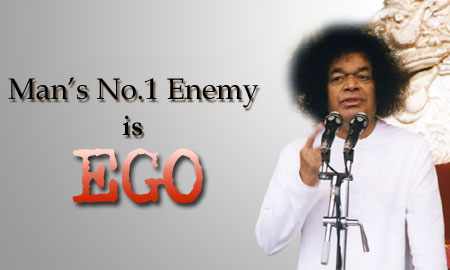 |
Never be egoistic. Egoism is another trait that will lead to disrepute. Examine yourself when you feel egoistic. Why should you have ego? On what grounds should you be egoistic? In the entire world, India is of the size of an ant. There, in India your state of Andhra Pradesh is the size of an eye of the ant. Your Anantapur district is but a speck in the eye of the ant. Then, how about Puttaparthi and what are you and your standing in your family? Practically nothing. So don't give any scope for ego and pride. Of course, if at all you want to be egoistic and proud, you can be egoistic about your ignorance and proud of your foolishness! Attachment and self-interest may make you egoistic on false grounds.
Attachment and feelings of “I and mine" are not in your own interest. The feelings of thine and mine arise out of abhimana (attachment)and ahamkara (ego). An example: Your neighbour has a daughter who was seriously ill for quite some time. You were not bothered or worried about her health. A year after her illness it so happened that you married her. Thereafter even a slight temperature or cold in her body makes you apply for casual leave and stay away from office. Why? She is your wife and no longer the daughter of your neighbour. The difference is only due to attachment.
Never feel that the world is permanent and that your relationships with all around you are lasting. No. The second point is that you should not forget God under any circumstances. The third aspect is to remember not to fear death. |
It is mamakara, the feelings of mine, that made Dhritarashtra, the old king of the Mahabharata support all the misdeeds of his sons and led to the total ruin of the entire clan. Though he had one hundred sons, he was left with none even to perform his last rites. To this state one will be reduced due to the feelings of 'I' and 'mine'.
When these traits find a place in you, repeat ten times "I am a man, not an animal", "I am a man, not an animal" so that you can get rid of the animal qualities like ahamkara, ego, asuya, jealousy, irsha, envy, dvesa, hatred, abhimana, attachment, and mamakara, feelings of 'I' and 'mine'.
Prof. Anil Kumar: Swami, how wonderfully in simple terms and in such an easy way you have explained profound things. What is the way to immortality, the ultimate goal of life?
Bhagavan: Very simple! Very easy! The only way to immortality is the removal of immorality.
Prof. Anil Kumar: Swami! How long does sensual pleasure last?
 |
|
Bhagavan: Sensual pleasure is momentary and fleeting. It lands you in difficulties and makes you weak. Think well and understand clearly. You think that you are enjoying with your senses. Actually, it is not so. The senses are enjoying at your expense.
At your cost the senses are having a nice time. How? You become weak. You lose your strength. You turn old. If you are right in thinking that you enjoy with your senses, you should have been quite active and enthusiastic. But in reality it is not so. You are negatively affected due to sensual pleasures. Therefore, know for sure that your senses enjoy you, making you sick, old and weak and not you enjoying with your senses.
Prof. Anil Kumar: Swami! How are we to lead a detached life? We are hurt when our belongings, positions and wealth are withdrawn. Please tell us how not to be hurt though these are taken away from us.}
Bhagavan: You should always keep in view the purpose and the aim of your life. You should never give up your duties and responsibilities. You see, today's newspaper is tomorrow's waste paper. Be assured that past life will never return. You should always keep in mind three important points.
Never feel that the world is permanent and that your relationships with all around you are lasting. No. The second point is that you should not forget God under any circumstances. The third aspect is to remember not to fear death.
 |
|
A District Collector has all the comforts and conveniences such as a big bungalow with a spacious compound, furniture, peons, etc. He has a very big office and personnel to provide assistance, but when he retires, he has to leave them all, though he lived till then with them as their sole proprietor and owner. Does he cry on the day of his retirement? Does he feel that he has lost anything personal? Similarly, servant maids, who take care of children at the residences of rich men or high officials consider the children very close to them and even say ‘our boy’, 'our child' and so on. But is it really so?
Can they claim and own them at any point of time? Similarly, you see a cashier in the bank. He has with him lakhs and lakhs of rupees, which he disburses to different account holders according to the cheques presented. Does he feel sad at any time for parting with the money? Not even a single paisa belongs to him.
The same is your relationship with the world you live in. Know the essence, saram, and lead this worldly life, samsaram. In fact, no one has anything to do with anything or anybody. You are alone at the time of both, your birth and death. The rest that comes in between are like passing clouds.
"Would you settle down on a bridge you cross from one end to another!
Would you like making a house, of a boat plying from bank to bank!
Would you build a mansion right in the middle of a highway!"
So, one must leave to one's own self questions like: 'Who am I?’ 'Where do I come from?' 'Who is God'? 'What is the purpose of life?' Human life is gifted to you to find answers to these questions.
For example: A villager goes to a nearby town on some business. As he could not complete his work, he has to stay in a lodge to rest. The proprietor of the hotel or lodge he chooses to stay in will naturally put some questions to him before letting out a room to him. He will ask the villager to register his name and address. He has to answer questions such as “Where do you come from? How long would you stay?"
You asked me how fear of death is to be overcome. The only solution is courage! You should understand that at some time or the other, death is inevitable. Realise that there are no exemptions. When you have the courage to realise this fully, fear of death ceases. |
If the answers run like this, “I do not know where I come from”, “I do not know how long I am going to be here”, “I do not know when I would quit this room”, or “I don't know where I shall go from here!" The proprietor will say, “No room for you. This lodge is not for mad fellows like you." Similar is your situation and position if you don't know where you come from, how long you stay here and where you go from here. Do your duty thinking of God. That is enough, then you will never suffer.
Prof. Anil Kumar: Swami! How are services rendered today helpful in future?
 |
Bhagavan: I will give an example very well known to you. After your retirement, you are given a pension. Why? It is the payment for your long service in a profession. So also, God's grace is bestowed on you for your service in the past.
Another example: If you fill the tank with water during the rainy season, you will have water supply in summer. Is it not so? Therefore, service of today will help you receive God's grace later, undoubtedly.
Prof. Anil Kumar: Swami! Is there death? Are there a heaven and a hell? What is life?
Bhagavan: There is no death. It is the body that dies. But atma, the indweller, is immortal. Atma is the eternal truth. Your happiness is indeed heaven. Your misery is hell. Both are here in this life. They are not separate entities apart from you.
The whole universe is a tree with branches, leaves, flowers and fruits. Man expects flowers and fruits and nurtures the tree by watering its roots. It is enough if you water the roots of a plant, in order to get the water circulated to different parts of the plant. Is it not so? Do you water the stem, branches and leaves separately? No, you don't. For this tree of the universe the branches are different countries and states; the leaves are desires; human beings are the flowers. The root is below and the fruit is on the top. The root is self- confidence while the fruit is self-realisation. The juice within the fruit is divinity. Today, there is no divinity but only community.
Prof. Anil Kumar: Swami! Man's greatest fear is the fear of death. How is he to overcome this?
 |
Bhagavan: Man is not dying of diseases. In fact, it is fear that makes for his death. Ninety eight percent of all deaths are to be traced to fear of death. Diseases are, for the most part, psychological in origin and impact. Check your pulse rate and blood pressure when you are excited, worried, or afraid; they rise much above the normal level. Thus, diseases are, to a large extent, rooted in your mental state.
Once, the deity of cholera came to a village. Seeing her, the village elder said, “Mother! I am terrified at the thought of the devastation soon to overtake our villages. I wonder how many of our people are going to die!" The deity replied, “My son! Not all will be harmed by me. There will be five deaths a day, that's all. You need not be that much alarmed.” But, many people were dying. The elder thought the deity might have lied to him. He turned to her and asked, “Mother, you are a deity. How is it then, that after saying one thing to me, contrary to that, you punish us?" The Cholera deity replied, "Son! I did not utter a falsehood. I took away only five each day. So, I am not responsible for the deaths of all the others. Those did not die of cholera; they died of fear, that's all. "
You asked me how fear of death is to be overcome. The only solution is courage! You should understand that at some time or the other, death is inevitable. Realise that there are no exemptions. When you have the courage to realise this fully, fear of death ceases.
Dear Reader, did this article inspire you in any way? Would you like more of such conversations with the Divine? Please share with us your reflections by writing to h2h@radiosai.org mentioning your name and country. Thank you for your time.





